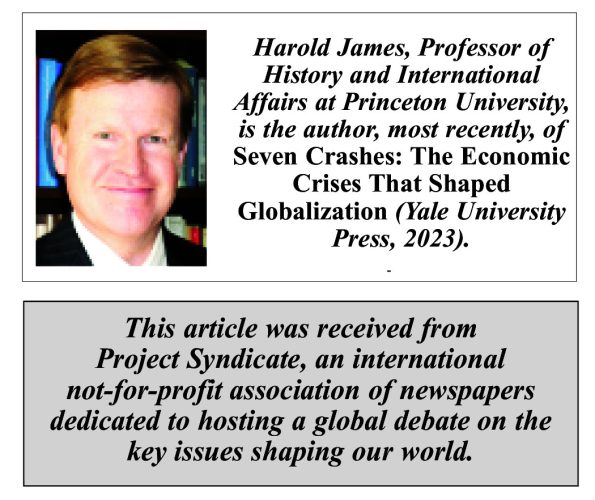PRINCETON – In 1987, the historian Paul Kennedy published his influential bestseller, The Rise and Fall of the Great Powers, which dwelled on the theme of imperial overreach and concluded with a look at the Soviet Union and the United States – the two great powers of the time. Within just a few years, the Soviet Union collapsed, opening the door for the US to emerge as the world’s only fully dominant power. Given recent events, however, it may be time to dust off Kennedy’s book and consider its lessons anew.
In July 2020, in the midst of the pandemic, I wrote a worried commentary titled “Late Soviet America.” We were nearing the end of President Donald Trump’s first term, and I feared that the US was stuck in a hopeless rut. Though the country had an enormous pool of talent and energy, the political system was dysfunctional. The two main parties selected their candidates undemocratically (since the primary process had mostly atrophied), and large-scale stimulus checks appeared to have become the preferred method of gaining political popularity.
In this context, the change from Trump to President Joe Biden made little difference. America did not have a Soviet-style one-party state, but nor did it have much inter- or intra-party democracy. Voters still felt shortchanged, and big spending was still seen as the key to electoral success and social stability. America seemed destined to remain in its late-Soviet stage.
The Soviet collapse transpired in two stages, with an immobile gerontocracy giving way to a misconceived attempt at radical, disruptive reform. When Konstantin Chernenko became General Secretary of the Communist Party in 1984, he was already 72. He had succeeded a senile Leonid Brezhnev and an ailing Yuri Andropov, but he himself was so decrepit that he struggled to read the eulogy at Andropov’s funeral. Then came Mikhail Gorbachev, who promised to rejuvenate the USSR by breaking the chains of the old bureaucracy with perestroika (economic reform) and glasnost (openness and transparency). But the effort to sweep away old thinking unleashed centrifugal forces, especially suppressed nationalisms, which soon swept away the Soviet Union itself.
Today, especially in Russia, many analysts are applying this analysis of Soviet decay to the US. Prominent figures compare Trump to Gorbachev, whose reforms shattered the USSR. While Trump is much older than Gorbachev was, he too is an insider who casts himself as an outsider, as someone who will break the system.
After camouflaging his revolutionary project during the campaign, Trump is now making his intentions clear. Like any successful political movement, Trump’s “Make America Great Again” (MAGA) prevailed by building a coalition. Working-class Americans (including higher numbers of Asian, Hispanic, and Black voters) who liked Trump’s anti-system message joined with highly influential, ultra-rich tech entrepreneurs who have their own ideas about how to transform the country.
Not surprisingly, this coalition is already showing signs of strain. The most obvious issue is that many of Trump’s proposed remedies will inevitably lead to inflation – the same problem that sunk President Joe Biden. New and higher tariffs will immediately increase the cost of living, and any serious attempt to round up and deport 11 million undocumented immigrants will create havoc and new labor shortages in agriculture, construction, and crucial distribution centers.
Equally, slashing the bureaucracy in the way that Elon Musk and Vivek Ramaswamy envision – through the new Department of Government Efficiency (DOGE) – would put large numbers of Americans out on the street. (These displaced workers are unlikely to rush into low-paying agricultural work.) Thus, while the brighter future remains only a vague promise, the looming costs and pain are readily apparent.
Those speaking for Silicon Valley also dream of unleashing artificial intelligence to boost productivity, and hence the earnings of lower-skilled workers. The idea is not preposterous on its face. There is empirical evidence that AI has precipitated at least the former boost in call centers. Productivity gains in other areas, such as health care and eldercare, are clearly possible. But neither this revolutionary “accelerationist” philosophy nor its potential applications have been tested at scale. Moreover, the Silicon Valley vision relies on a globally connected world in which the US has been the dominant player.
Thus, while Musk fully signs on to Trump’s project of complete disruption, his own vision – paradoxically – combines technology with the “globalist” status quo. “Business-as-usual is driving America bankrupt,” he argues, “so we need change one way or another.” Musk rightly applauds Argentinian President Javier Milei’s shock therapy of eliminating tariffs and opening the Argentine economy, yet we all know that “tariff” is Trump’s favorite word. It remains to be seen how this obvious tension will be resolved.
On a more optimistic note, US disengagement, by itself, cannot provoke a Great Depression-level global trade collapse, since America accounts for only 13.5% of the world’s imports. Of course, other countries may retaliate or simply try to ape Trump. But the more chaotic Trump is, the less likely he is to find imitators. Just look at the deterrent effect that Brexit had on other Euroskeptics, or how eager most Soviet successor states were to adopt a different mindset.
So, part of the Trumpian coalition wants globalism, and the other part rejects it. The irony is that the latter camp will feel the most pain from attempts to turn inward. Trump’s policy agenda, if enacted, will inevitably sow the seeds of a new wave of discontent, protest, and conspiracy theorizing.
The same description applies to the post-Soviet experience in the closing years of the twentieth century. Abrupt, rapid change only led to disruption, with all those harmed by it joining the next cohort of the alienated. A similar dynamic appears to be taking hold in the US. Today’s Russia certainly hopes so.
Copyright: Project Syndicate, 2024.
